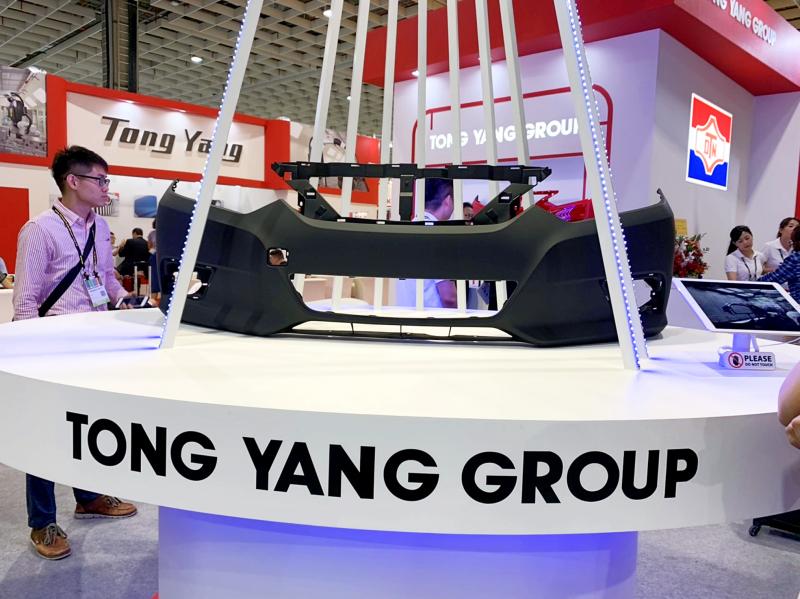Tong Yang Industry Co (東陽實業), a supplier of automotive metal sheets and bumpers, yesterday reported that pretax profit last month surged 32 percent to NT$135.29 million (US$4.6 million) from July thanks to recovering demand in the Chinese market.
It was the fourth consecutive month of pretax profit growth for Tong Yang, indicating that the effects of the COVID-19 pandemic are easing, the Tainan-based company said.
Although a monthly increase, the figure was a decline of 36 percent from a pretax profit of NT$211.21 million that it made a year earlier, company data showed.

Photo: Lin Chin-hua, Taipei Times
“Promotions by the Chinese government for new-energy vehicles in rural areas have boosted new vehicle sales, helping to prop up revenue growth for Tong Yang’s Chinese operations,” the company said in a statement.
Demand has also increased because the global automotive aftermarket is entering its peak season, the company said, adding that it is optimizing its production lines and increasing inventory levels to cope with the seasonal demand.
Aftermarket business refers to the secondary market in the automotive industry, which offers the sale, distribution and installation of vehicle parts, chemicals, equipment and accessories to people who have purchased from automakers.
During the first eight months of this year, Tong Yang’s pretax profit totaled NT$564 million, declining 65.76 percent from the NT$1.66 billion that it made a year earlier, as auto factories were forced to shutter amid the spread of COVID-19.
Consolidated revenue plunged about 22 percent year-on-year to NT$11 billion in the first eight months, company data showed.

GEOPOLITICAL ISSUES? The economics ministry said that political factors should not affect supply chains linking global satellite firms and Taiwanese manufacturers Elon Musk’s Space Exploration Technologies Corp (SpaceX) asked Taiwanese suppliers to transfer manufacturing out of Taiwan, leading to some relocating portions of their supply chain, according to sources employed by and close to the equipment makers and corporate documents. A source at a company that is one of the numerous subcontractors that provide components for SpaceX’s Starlink satellite Internet products said that SpaceX asked their manufacturers to produce outside of Taiwan because of geopolitical risks, pushing at least one to move production to Vietnam. A second source who collaborates with Taiwanese satellite component makers in the nation said that suppliers were directly

Top Taiwanese officials yesterday moved to ease concern about the potential fallout of Donald Trump’s return to the White House, making a case that the technology restrictions promised by the former US president against China would outweigh the risks to the island. The prospect of Trump’s victory in this week’s election is a worry for Taipei given the Republican nominee in the past cast doubt over the US commitment to defend it from Beijing. But other policies championed by Trump toward China hold some appeal for Taiwan. National Development Council Minister Paul Liu (劉鏡清) described the proposed technology curbs as potentially having

EXPORT CONTROLS: US lawmakers have grown more concerned that the US Department of Commerce might not be aggressively enforcing its chip restrictions The US on Friday said it imposed a US$500,000 penalty on New York-based GlobalFoundries Inc, the world’s third-largest contract chipmaker, for shipping chips without authorization to an affiliate of blacklisted Chinese chipmaker Semiconductor Manufacturing International Corp (SMIC, 中芯). The US Department of Commerce in a statement said GlobalFoundries sent 74 shipments worth US$17.1 million to SJ Semiconductor Corp (盛合晶微半導體), an affiliate of SMIC, without seeking a license. Both SMIC and SJ Semiconductor were added to the department’s trade restriction Entity List in 2020 over SMIC’s alleged ties to the Chinese military-industrial complex. SMIC has denied wrongdoing. Exports to firms on the list

SPECULATION: The central bank cut the loan-to-value ratio for mortgages on second homes by 10 percent and denied grace periods to prevent a real-estate bubble The central bank’s board members in September agreed to tighten lending terms to induce a soft landing in the housing market, although some raised doubts that they would achieve the intended effect, the meeting’s minutes released yesterday showed. The central bank on Sept. 18 introduced harsher loan restrictions for mortgages across Taiwan in the hope of curbing housing speculation and hoarding that could create a bubble and threaten the financial system’s stability. Toward the aim, it cut the loan-to-value ratio by 10 percent for second and subsequent home mortgages and denied grace periods for first mortgages if applicants already owned other residential